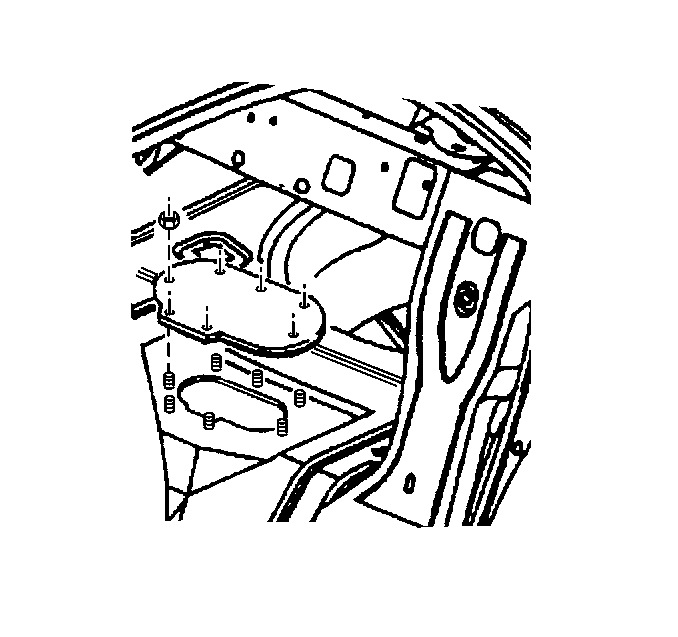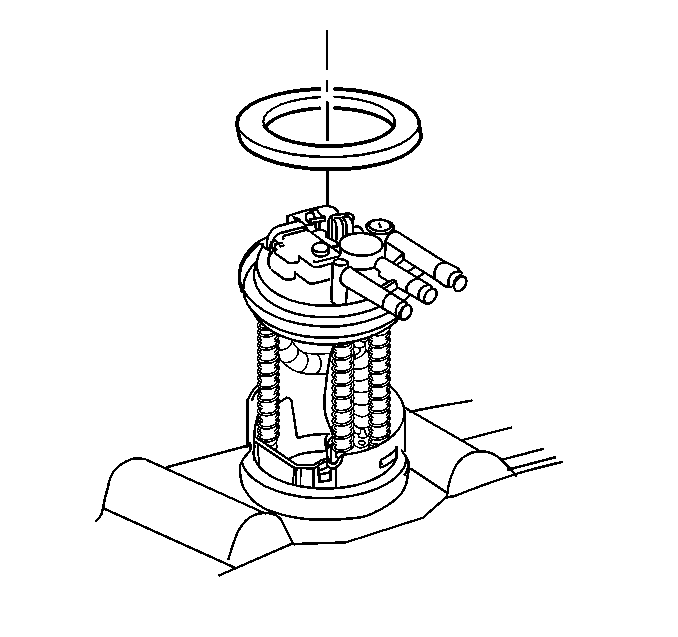Removal Procedure
Caution: Fuel Vapors can collect while servicing fuel system parts in enclosed
areas such as a trunk. To reduce the risk of fire and increased exposure to
vapors:
• Use forced air ventilation such as a fan set outside
of the trunk. • Plug or cap any fuel system openings in order to reduce fuel vapor
formation. • Clean up any spilled fuel immediately. • Avoid sparks and any source of ignition. • Use signs to alert others in the work area that fuel system work
is in process.
Notice: Clean all of the following areas before performing any disconnections
in order to avoid possible contamination in the system:
• The fuel pipe connections • The hose connections • The areas surrounding the connections
Important: For fuel sender assemblies accessible through the rear compartment, completely remove the rear compartment carpet before removing the fuel sender access panel.
Important: Always replace the fuel sender O-rings when installing the fuel sender assembly.
Important: The modular fuel sender assembly will spring-up when the snap ring is removed.
Important: Always maintain cleanliness when servicing the fuel system components.
- Relieve the fuel system fuel pressure. Refer to Fuel Pressure Relief .
- Remove the rear compartment trim panel. Refer to Rear Compartment Trim Panel Replacement in Body Rear End.
- Remove the seven nuts retaining the fuel sender access panel.
- Remove the fuel sender access panel.
- Disconnect the fuel tank pressure (FTP) sensor electrical connector.
- Disconnect the fuel sender electrical connector.
- Clean the fuel pipes and the fuel sender assembly to prevent fuel contamination during removal.
- Disconnect the quick-connect fittings at the fuel sender assembly. Refer to Plastic Collar Quick Connect Fitting Service .
- Remove the snap ring retaining the fuel sender.
- Remove the modular fuel sender assembly.
- Inspect and clean the O-ring sealing surfaces on the fuel sender assembly .


Installation Procedure
Notice: Always re-attach the fuel lines and fuel filter with all original type fasteners and hardware.
Do not repair sections of fuel pipes.Important: Care should be taken not to fold or twist the fuel pump strainer when installing the fuel sender assembly, as this will restrict the fuel flow. Also, ensure that the fuel pump strainer does not block the full travel of the float arm.
Important: Ensure that the snap ring retaining the fuel sender assembly is fully seated within the tab slots on the fuel tank.
- Position the new O-ring for the fuel sender assembly on the fuel tank.
- Install the fuel sender assembly into the fuel tank.
- Install the snap ring retaining the fuel sender assembly while holding the fuel sender in place.
- Connect the quick-connect fittings at the fuel sender assembly. Refer to Plastic Collar Quick Connect Fitting Service .
- Connect the fuel sender electrical connector.
- Connect the FTP sensor electrical connector.
- Install the fuel filler cap.
- Connect the negative battery cable. Refer to Battery Negative Cable Disconnection and Connection in Engine Electrical.
- Inspect for leaks using the following procedure:
- Install the fuel sender access panel.
- Install the nuts retaining the fuel sender access panel.
- Install the rear compartment trim panel. Refer to Rear Compartment Trim Panel Replacement in Body Rear End.
- Install the spare tire, the jack, and the spare tire cover.

| 9.1. | Turn ON the ignition, for 2 seconds. |
| 9.2. | Turn OFF the ignition, for 10 seconds. |
| 9.3. | Turn ON the ignition. |
| 9.4. | Inspect for leaks. |

Notice: Use the correct fastener in the correct location. Replacement fasteners must be the correct part number for that application. Fasteners requiring replacement or fasteners requiring the use of thread locking compound or sealant are identified in the service procedure. Do not use paints, lubricants, or corrosion inhibitors on fasteners or fastener joint surfaces unless specified. These coatings affect fastener torque and joint clamping force and may damage the fastener. Use the correct tightening sequence and specifications when installing fasteners in order to avoid damage to parts and systems.
Tighten
Tighten the nuts to 10 N·m (88 lb in)
